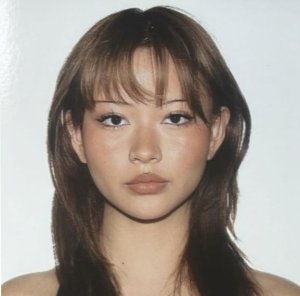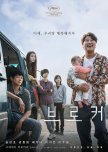Esta resenha pode conter spoilers
A melancholic road trip about abandonment.
In his first Korean-language film, Shoplifters director Hirokazu Kore Eda takes us on a rewarding road trip with an odd group of abandoned people. Think Little Miss Sunshine but instead of a beauty pageant, the group tries to sell a baby on the black market... Literally.
At one point, Sang Hyun and Dong Soo are described as child brokers, and considering the kind of business they run, that's probably an apt description.
In some countries, such as South Korea, there are so-called baby hatches where mothers can anonymously leave their babies behind (there are arguments for and against the system that will not be elaborated here). Dong Soo, a baby hatch worker, together with Sang Hyun, a laundry owner, decide to steal a baby to sell to rich and desperate couples who cannot cope with South Korea's complicated adoption laws.
So Young, the young mother who abandoned the baby, discovers them and decides to join them on a road trip to find the best candidates to adopt her child. Broker is about responsibility and forgiveness. It reflects on the family we find in the course of life, and the family we have to let go of along the way.
What Sang Hyun and Dong Soo do isn't very moral, it's a form of human trafficking after all, but the movie doesn't show them as bad people. At the same time, So Young is not a bad person either, even though she tried to abandon her child. The central characters in the story have all been abandoned in some way, be it a divorce or in an orphanage. They all want to give this child a good home with a financially secure family, and they know that won't happen through the legal system of their country.
It is a tragic but poetic coincidence that Broker was released at the same time as the news about abortion rights in the US. The film may feel a little different now because of that, but the focus here is on children who, due to circumstances beyond their control, feel they shouldn't have been born. In Broker there are no decisions that feel right. How can one even choose when it comes to possibly abandoning their child? The magic is how well Kore Eda maps that conflict.
With such broken characters, heavy themes, and dark thoughts about parenting and abandoning children, Broker could have resulted in a much more depressing film. It is thanks to how well Kore Eda is able to balance these ideas along with hope and humor that makes the result more uplifting. The deeper questions are there for anyone who wants to read into what the film has to say, but it's not a barrier to entry to a meaningful experience.
At one point, Sang Hyun and Dong Soo are described as child brokers, and considering the kind of business they run, that's probably an apt description.
In some countries, such as South Korea, there are so-called baby hatches where mothers can anonymously leave their babies behind (there are arguments for and against the system that will not be elaborated here). Dong Soo, a baby hatch worker, together with Sang Hyun, a laundry owner, decide to steal a baby to sell to rich and desperate couples who cannot cope with South Korea's complicated adoption laws.
So Young, the young mother who abandoned the baby, discovers them and decides to join them on a road trip to find the best candidates to adopt her child. Broker is about responsibility and forgiveness. It reflects on the family we find in the course of life, and the family we have to let go of along the way.
What Sang Hyun and Dong Soo do isn't very moral, it's a form of human trafficking after all, but the movie doesn't show them as bad people. At the same time, So Young is not a bad person either, even though she tried to abandon her child. The central characters in the story have all been abandoned in some way, be it a divorce or in an orphanage. They all want to give this child a good home with a financially secure family, and they know that won't happen through the legal system of their country.
It is a tragic but poetic coincidence that Broker was released at the same time as the news about abortion rights in the US. The film may feel a little different now because of that, but the focus here is on children who, due to circumstances beyond their control, feel they shouldn't have been born. In Broker there are no decisions that feel right. How can one even choose when it comes to possibly abandoning their child? The magic is how well Kore Eda maps that conflict.
With such broken characters, heavy themes, and dark thoughts about parenting and abandoning children, Broker could have resulted in a much more depressing film. It is thanks to how well Kore Eda is able to balance these ideas along with hope and humor that makes the result more uplifting. The deeper questions are there for anyone who wants to read into what the film has to say, but it's not a barrier to entry to a meaningful experience.
Esta resenha foi útil para você?

























